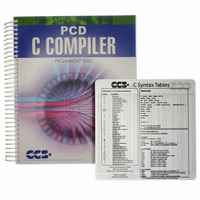PCDIDE COMPILER Custom Computer Services Inc (CCS), PCDIDE COMPILER Datasheet - Page 133

PCDIDE COMPILER
Manufacturer Part Number
PCDIDE COMPILER
Description
PCD C-COMPILER PIC24, DSPIC
Manufacturer
Custom Computer Services Inc (CCS)
Type
Compilerr
Datasheet
1.PCD_COMMAND_LINE_COMPILER.pdf
(373 pages)
Specifications of PCDIDE COMPILER
For Use With/related Products
Microchip PIC24/dsPIC®
Lead Free Status / RoHS Status
Not applicable / Not applicable
Other names
429-1008
- Current page: 133 of 373
- Download datasheet (4Mb)
#INCLUDE
Syntax:
Elements:
Purpose:
Examples:
Example Files:
Also See:
#INLINE
Syntax:
Elements:
Purpose:
Examples:
Example Files:
Also See:
#INCLUDE <filename>
#INCLUDE "filename"
filename is a valid PC filename. It may include normal drive and path
information. A file with the extension ".encrypted" is a valid PC file. The standard
compiler #INCLUDE directive will accept files with this extension and decrypt
them as they are read. This allows include files to be distributed without releasing
the source code.
Text from the specified file is used at this point of the compilation. If a full path is
not specified the compiler will use the list of directories specified for the project to
search for the file. If the filename is in "" then the directory with the main source
file is searched first. If the filename is in <> then the directory with the main
source file is searched last.
#include
#include
ex_sqw.c
None
#INLINE
None
Tells the compiler that the function immediately following the directive is to be
implemented INLINE. This will cause a duplicate copy of the code to be placed
everywhere the function is called. This is useful to save stack space and to
increase speed. Without this directive the compiler will decide when it is best to
make procedures INLINE.
#inline
swapbyte(int &a, int &b) {
}
ex_cust.c
#SEPARATE
or
int t;
t=a;
a=b;
b=t;
<16C54.H>
<C:\INCLUDES\COMLIB\MYRS232.C>
119
Related parts for PCDIDE COMPILER
Image
Part Number
Description
Manufacturer
Datasheet
Request
R

Part Number:
Description:
PROTOTYPING BOARD FOR PIC MCU
Manufacturer:
Custom Computer Services Inc (CCS)

Part Number:
Description:
Extra CCS C Manual
Manufacturer:
Custom Computer Services Inc (CCS)

Part Number:
Description:
MACH X Programmer
Manufacturer:
Custom Computer Services Inc (CCS)

Part Number:
Description:
PCD For 24-bit (PIC24/dsPIC)
Manufacturer:
Custom Computer Services Inc (CCS)

Part Number:
Description:
LOAD-n-GO Programmer
Manufacturer:
Custom Computer Services Inc (CCS)

Part Number:
Description:
EMBEDDED INTERNET DEVELOPMENT KIT W/PCWH
Manufacturer:
Custom Computer Services Inc (CCS)

Part Number:
Description:
PIC24F Development Kit With PCWHD
Manufacturer:
Custom Computer Services Inc (CCS)

Part Number:
Description:
PIC24F Development Kit With PCDIDE
Manufacturer:
Custom Computer Services Inc (CCS)

Part Number:
Description:
PIC24H Development Kit With PCWHD
Manufacturer:
Custom Computer Services Inc (CCS)

Part Number:
Description:
USB Master Prototyping Board
Manufacturer:
Custom Computer Services Inc (CCS)










